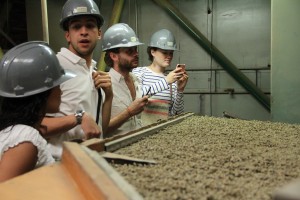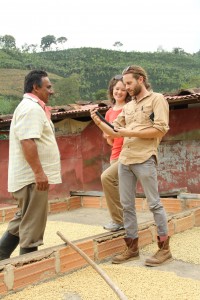 Stanford and Sustainable Harvest
® Staff assess current parchment drying facilities
Stanford and Sustainable Harvest
® Staff assess current parchment drying facilities
Parchment drying is not just a simple checkbox step in the line of specialty coffee processing - it plays a critical role in the final cup quality. In fact, a considerable amount of quality-related problems can be traced back to improper drying processes. Although major efforts have been made to improve drying processes in large warehouses and processing plants at origin, this has not been the case at the farm level, where adequate drying facilities are critical to maximizing price upon delivery to the plant. And yet shifting rainfall patterns as a result of climate change are making it increasingly difficult for farmers to achieve acceptable moisture levels prior to transfer, using only patio space or raised beds.
 Stanford d.School staff interview Colombian coffee farmer on drying techniques
Stanford d.School staff interview Colombian coffee farmer on drying techniques
To address this issue, Sustainable Harvest® is thrilled to be partnering with the Stanford d.School to devise an innovative new solution to the farm-level drying process. Over the last six months our Colombian team has worked closely with the teaching team for the Design for Extreme Affordability course to educate them on current practices and the challenges faced by coffee farmers at origin. Based on the findings during this assessment period, Sustainable Harvest® was officially named as an EXTREME partner in January.
The two-quarter course, running January - June, is offered to all Stanford graduate students. The class is comprised of interdisciplinary teams representing many different departments. The teams learn "design thinking" and then apply it to projects that serve customers at the base of the economic pyramid. Results include a prototype and implementation plan for the solution at hand. Past examples include design solutions relative to food preparation, infant mortality, agricultural disease control and personal health management, among others.
Just this week class assignments were made and we're excited to have a team of incredibly qualified graduate students from biology, business, international policy and design disciplines dedicated to the project. And as a last minute surprise, we were assigned a second team that will focus on designing a more effective de-pulping process. More on this later.
Keep an eye on this space for updates as the work with Stanford progresses.



.png)
